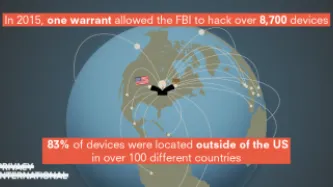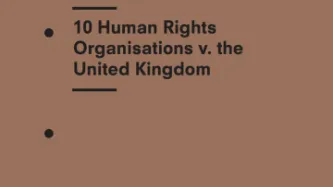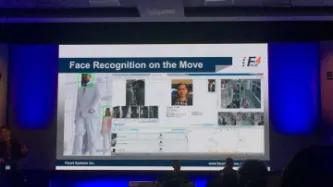Search
Content type: News & Analysis
Taylor Swift may be tracking you, particularly if you were at her Rose Bowl show in May.
According to an article published by Vanity Fair, at Swift’s concert at the California stadium, fans were drawn to a kiosk where they could watch rehearsal clips. At the same time – and without their knowledge - facial-recognition cameras were scanning them, and the scans were then reportedly sent to a “command post” in Nashville, where they were compared to photos of people who are known…
Content type: Examples
In May 2018, US Immigration and Customs Enforcement abandoned the development of machine learning software intended to mine Facebook, Twitter, and the open Internet to identify terrorists. The software, announced in the summer of 2017, had been a key element of president Donald Trump's "extreme vetting" programme and expected to flag at least 10,000 people a year for investigation. ICE decided instead to opt for a contractor who could provide training, management, and human personnel to do the…
Content type: News & Analysis
This piece was originally published on Just Security.
Ten years ago, an FBI official impersonated an Associated Press reporter to lure and track a teenager suspected of sending in prank bomb threats to his school. To find him, the FBI agent, posing as a reporter, sent the teenager links to a supposed story he was working on, but the links were infested with malware that once clicked on quickly exposed the teen’s location. More recently, the FBI has seized and modified websites so…
Content type: News & Analysis
This piece originally appeared here.
Creative Commons Photo Credit: Source
Tech competition is being used to push a dangerous corporate agenda.
High-tech industries have become the new battlefield as the United States and China clash over tariffs and trade deficits. It’s a new truism that the two countries are locked in a race for dominance in artificial intelligence and that data could drive the outcome.
In this purported race for technological high ground, the argument often goes, China…
Content type: Report
Countries with powerful security agencies are spending literally billions to equip, finance and train security and surveillance agencies around the world — including authoritarian regimes. This is resulting in entrenched authoritarianism, further facilitation of abuse against people, and diversion of resources from long-term development programmes.
Privacy International's report 'Teach 'em to Phish: State Sponsors of Surveillance' examines this problem closely, providng examples from US, China…
Content type: Long Read
Privacy International (PI) has today released a new report, 'Teach 'em to Phish: State Sponsors of Surveillance', showing how countries with powerful security agencies are training, equipping, and directly financing foreign surveillance agencies.
Spurred by advances in technology, increased surveillance is both powered by and empowering rising authoritarianism globally, as well as attacks on democracy, rights, and the rule of law.
As well as providing a background to the issue, the report…
Content type: Press release
Privacy International has today released a report that looks at how powerful governments are financing, training and equipping countries — including authoritarian regimes — with surveillance capabilities. The report warns that rather than increasing security, this is entrenching authoritarianism.Countries with powerful security agencies are spending literally billions to equip, finance, and train security and surveillance agencies around the world — including authoritarian regimes. This is…
Content type: Press release
On the five year anniversary of NSA whistleblower Edward Snowden leaking a massive trove of classified information that has since transformed our understanding of government mass surveillance, Dr Gus Hosein, Executive Director of Privacy International said:
“Is it enough for your government to tell you ‘we’re keeping you safe, but we’re not going to tell you how’? Edward Snowden asked himself this profoundly important question five years ago. We’re thankful he did.
His decision to expose the…
Content type: Advocacy
Social media, which can include a wide range of online platforms and applications, can be revealing and sensitive, making any collection or retention highly invasive. The effect would be unjustified intrusion into the private lives of those affected, undermining their freedom of speech and affecting everyone in their networks, including US citizens.
By normalising the practice internationally, other state authorities may reciprocate by demanding social media handles of US citizens,…
Content type: Examples
In 2016, the American Civil Liberties Union of Northern California published a report revealing that the social media monitoring service Geofeedia had suggested it could help police track protesters. The report's publication led Twitter and Facebook to restrict Geofeedia's access to their bulk data. ACLUNC argued that even though the data is public, using it for police surveillance is an invasion of privacy. Police are not legally required to get a warrant before searching public data; however…
Content type: Examples
Documents submitted as part of a 2015 US National Labor Relations Board investigation show that Walmart, long known to be hostile to unions, spied on and retaliated against a group of employees who sought higher wages, more full-time jobs, and predictable schedules. In combating the group, who called themselves the Organization United for Respect at Walmart (OUR Walmart), Walmart hired an intelligence-gathering service from Lockheed Martin, contacted the FBI, and set up an internal Delta team…
Content type: Long Read
This piece was originally published in Lawfare in April 2018
The United States is party to a number of international intelligence sharing arrangements—one of the most prominent being the so-called “Five Eyes” alliance. Born from spying arrangements forged during World War II, the Five Eyes alliance facilitates the sharing of signals intelligence among the U.S., the U.K., Australia, Canada and New Zealand. The Five Eyes countries agree to exchange by default all signals intelligence…
Content type: News & Analysis
Simply put, the National Security Agency is an intelligence agency. Its purpose is to monitor the world's communications, which it traditionally collected by using spy satellites, taps on cables, and placing listening stations around the world.
In 2008, by making changes to U.S. law, the U.S. Congress enabled the NSA to make U.S. industry complicit in its mission. No longer would the NSA have to rely only on international gathering points. It can now go to domestic companies who hold massive…
Content type: Long Read
“FISA section 702 reauthorisation” might not sound like it matters very much to very many people, but it’s pretty dramatic: in short, last month US lawmakers rejected a bill which would have provided protections for US citizens – constitutionally protected against being spied on by US spy agencies – from being spied on, and instead voted to extend their powers to do so.
In the fall out, it’s worth considering just why such mass surveillance powers are such a big issue, how the promise of…
Content type: News & Analysis
7 July 2016
It has been said is that we pay for free services with our personal data. Now, the Privacy Shield exponentially expands this truth and we are paying for the cost of U.S. political dysfunction combined with EU complacency with our privacy. More than four months after the first EU-US Privacy Shield was published on 29 February 2016, a new version has been leaked. Remarkably, it is expected to be adopted.
Four months, two opinions by group of EU data protection…
Content type: News & Analysis
The elections in our midst here, there, and everywhere are increasingly resulting in governments who introduce policies that result in leaps backwards for dignity, equality, civil liberties, and the rule of law. Whether it is Poland or the Philippines, governments are overriding essential safeguards.
This week Britain’s proposed surveillance legislation took another step toward normalising mass surveillance. The United States of America has long promoted mass surveillance and maintains its…
Content type: Long Read
This piece was originally published in Just Security in November 2017.
The upcoming expiration of Section 702 of the Foreign Intelligence Surveillance Act (FISA) has launched a fresh wave of debate on how the statute’s “backdoor search loophole” allows the U.S. government to access Americans’ communications by searching information gathered on foreign intelligence grounds without a warrant. But while discussion about domestic information sharing is important, a critical…
Content type: News & Analysis
For further information on timeline and case history, read this briefing.
Arguments
The argument were based on the written submissions of the parties. The oral statements summarised key points in these submissions.
The submissions can be found on PI’s website under Legal Action. In terms of today’s proceedings (these are now available through webcast)
Counsel for the UK Government, James Eadie QC started off proceedings, his opening arguments were: 1) The issues are of…
Content type: Press release
The European Court of Human Rights will hear a landmark case on surveillance tomorrow (7 November) as part of a challenge to the lawfulness of the UK’s surveillance laws and its intelligence agencies’ mass surveillance practices.
See the attached briefing for case background and historical information.
The case, described by campaigners as a “watershed moment for people’s privacy and freedom of expression across the world”, is being brought by Amnesty International, Liberty, Privacy…
Content type: Press release
Privacy International has filed a federal lawsuit seeking to compel disclosure of records relating to a 1946 surveillance agreement between the US, UK, Australia, Canada and New Zealand, known as the “Five Eyes alliance”.* We are represented by Yale Law School’s Media Freedom and Information Access Clinic (MFIA). The most recent publicly available version of the Five Eyes surveillance agreement dates from 1955. Our complaint was filed before the U.S. District Court for the District of Columbia…
Content type: News & Analysis
From unlocking a smartphone or getting through an airport, the use of an iris, fingerprint, or your face for identity verification is already widespread, and the market for it is set to rocket. While the technology is not new, its capability and uses are. As people, biometrics offers us much, but risks ultimately only serve data-hungry industries and government agencies: in the name of efficiency and security, it has the potential to bring chaos and vulnerability.
Obtaining reliable…
Content type: News & Analysis
The United States Department of Homeland Security (DHS) has contracted one of the world’s largest arms companies to manage a huge expansion of its biometric surveillance programme.
According to a presentation seen by Privacy International, the new system, known as Homeland Advanced Recognition Technology (HART), will scoop up a whopping 180 million new biometric transactions per year by 2022.
It will replace the Automated Biometric Identification System (IDENT), which currently stores…
Content type: Advocacy
Privacy International wishes to raise serious concerns regarding the proposal to expand immigration records to include social media handles, associated identifiable information and search results. Specifically, in relation to the current request for comments Docket Number DHS 2017 0038, we object to the Department for Homeland Security proposal to update record source categories to include “publicly available information obtained from the internet”, “commercial data providers” and from “…
Content type: Press release
Privacy International, in partnership with 30+ national human rights organisations, has today written to national intelligence oversight bodies in over 40 countries seeking information on the intelligence sharing activities of their governments.
Countries may use secret intelligence sharing arrangements to circumvent international and domestic rules on direct surveillance. These arrangements can also lead to the exchange of information that can facilitate human rights abuses,…
Content type: Advocacy
Privacy International has today submitted comments to a U.S. government consultation on whether the US Department of Homeland Security (DHS) should keep the social media details of individuals travelling to the US in so-called “Alien Files” documenting all immigrants.
We’ve urged that they don’t, and that they review and stop all similar social media surveillance by the DHS.
The systematic surveillance of social media is an increasingly dangerous trend …
Content type: Long Read
This piece was originally published in Just Security in August 2017
We recently published an analysis in Lawfare of the United Kingdom’s surveillance framework as it relates to the proposed U.S.-U.K. agreement for cross-border law enforcement data requests. Implementing the U.S.-U.K. agreement is subject to passage of draft legislation proposed by the Justice Department to Congress in July 2016 (“U.S. DOJ legislation”), which will set standards that approved partners like the U.K.…
Content type: Long Read
This piece was originally published in Lawfare in July 2017.
The United Kingdom has been a key partner in the United States’ efforts to reform the process that law enforcement officials use to make cross-border requests for data. These efforts address both foreign governments’ requests for data stored in the U.S. and reciprocal requests by the U.S. government for data stored abroad. As part of these efforts, the U.S. and the U.K. have negotiated a draft bilateral agreement (“U…
Content type: Long Read
This piece was originally published in Lawfare in May 2017.
This post is part of a series written by participants of a conference at Georgia Tech in Surveillance, Privacy, and Data Across Borders: Trans-Atlantic Perspectives.
Cross-border law enforcement demands have become increasingly important to law enforcement in the digital age. Digital evidence in one jurisdiction—such as the United States—is often necessary to investigate a crime that has effects in another jurisdiction…
Content type: Long Read
Disclaimer: This piece was written in April 2017. Since publishing, further information has come out about Cambridge Analytica and the company's involvement in elections.
Recently, the data mining firm Cambridge Analytica has been the centre of tons of debate around the use of profiling and micro-targeting in political elections. We’ve written this analysis to explain what it all means, and the consequences of becoming predictable to companies and political campaigns.
What does…
Content type: News & Analysis
This week the United States Congress voted to strip away one of the country’s few safeguards of the right to privacy by repealing rules which would have limited internet service provider’s ability to use or share customers’ data without customers’ approval.
Meanwhile, last week, 6,500 kilometers away in Geneva, the United Nations Human Rights Council called on states to strengthen customers’ control over their data and develop legislation to address harm from the sale or corporate sharing of…























